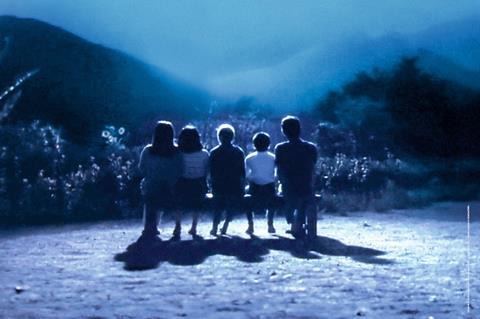
From politics to buzz films, star appearances and deal making, there was – as always – plenty to talk about at this year’s Cannes Film Festival. Screen gathers together the major discussion points of this year’s festival.
Muted politics
In the build-up to Cannes, there was much talk about how this year’s festival was set to be the most politically charged edition of recent years, amid Israel’s war on Gaza, festival workers threatening strike action and rumours of bombshell #MeToo accusations set to rock the French industry. The result was far more muted, with the #MeToo accusations quickly dissolving and little disruption from festival workers. However, individuals quietly and deftly made their points. Members and allies of the Palestinian film community organised a gathering at the Algerian pavilion (Palestine does not have its own) to observe a moment’s silence on Tuesday May 21 in memory of those killed in Gaza. Subtle statements crept in on the red carpet – Cate Blanchett wore a black dress with a white and green lining at the back to The Apprentice premiere which, when held up against the red carpet, appeared to resemble the Palestinian flag. Others wore pins in support of Palestine. Laura Blajman-Kadar, a survivor of the October 7 Hamas attacks on Israel, was more overt, wearing a bright yellow dress with the faces of hostages held in Gaza and a sash reading, “Bring them home”.
Opportunistic streamers
The platforms are always on the lookout for an opportunistic buy. Amazon Prime Video was active, taking multiple territories on Ron Howard’s survival thriller Eden and Will Smith action thriller Sugar Bandits in separate deals struck with AGC International. The platform has also reportedly picked up a slew of international rights on the Liam Neeson action thriller Mongoose in a deal with Solution Entertainment Group. Netflix pre-bought Glen Powell legal drama Monsanto for the world in a deal reported to be worth around $30m from Rocket Science and CAA Media Finance. And, as of Friday afternoon (May 24), Screen understands streamers are among buyers circling US rights on Jacques Audiard’s well-received Competition entry Emilia Perez.
Quiet US buyers
Generally, US buyers have been on the quiet side in Cannes with the exception of Neon, which pounced on Mohammad Rasoulof’s Palme d’Or contender The Seed Of The Sacred Fig and several packages in the market. On a lower scale of economy but no less impressive, Sideshow and Janus Films have picked up Payal Kapadia’s Competition entry All We Imagine As Light and Gints Zilbalodis’ Flow in Un Certain Regard.
Price pressures
Buyers frequently complain about high asking prices and this year was no different. US talent costs shot up after the Hollywood strikes ended and studios and streamers returned to production. The independents have had to pay a premium to hold on to star attachments and sales agents have hiked their asks to satisfy financiers. Some high prices also stem from financing arrangements struck more than a year ago, when deep-pocketed platforms were buying with more vigour. Rising inflation has compounded the problem with production costs soaring. This has all meant producers and sales agents have seen buyers without robust pay-1 deals struggle to afford big-ticket items. A year from now could offer a temperature check.
International deal delays
The many French sales companies doing business in Cannes are a bellwether for the market. This year, leading sales companies report the market was strong but that deals are taking more time to close. Alexandre Moreau, head of sales at Memento International, says the market is still ongoing “and will be into next week”. Several sellers told Screen Competition titles have been hot commodities with titles including Emilia Perez, Beating Hearts, The Most Precious Of Cargoes, All We Imagine As Light and Wild Diamond all selling widely. But films in other sections have struggled to draw attention from distributors.
Asia returns
Buyers and sellers from Asia increased their numbers this year but total figures are still below pre-pandemic levels. The presence from Japan grew compared to last year and there continued to be robust attendance from South Korea. Chinese attendance rose from around 250 in 2023 to some 300 this year, but is still lagging behind pre-pandemic levels of up to 650. Those Asian execs who returned to Cannes did not paint a wholly positive picture. “It wasn’t bad but it also wasn’t particularly good either,” one source told Screen. From Japan, where the yen remains weak, sources bemoaned the rising costs of Cannes apartments and booths, leading to a reduction in staff members on the ground. Several Hong Kong sellers said the market still had not rediscovered pre-Covid momentum, although Asian buyers in China and Singapore were active. From Korea, one source observed fewer buyers because “there weren’t enough big titles to buy”, with budgets pushed toward just a couple of high-profile features. But this will not put off their return in future. Key Asia professionals agreed that Cannes remains the “one-stop shop” market where Asia “can meet with the global industry outside its region”.
Ticketing turnaround
Festivals get plenty of stick when things go wrong, but are rarely praised when they are fixed. This year, Cannes got it right. Last year the ticketing platform was described as a “shambles”; press, critics and other festival and market-goers all complained of the difficulty in booking tickets, and Cannes’ delegate general Thierry Fremaux had to apologise. This year there seemed to be no such problems. Critics reported the site was relatively straightforward to use – as long as they were online on the dot of 07.00 to stand a chance of booking for a film they wanted to see. This year’s bugbear for a few days was the abundance of security into the market that caused queues and reports of missed meetings. Again, organisers listened and responded promptly, opening up another fast-track lane to help get delegates on their way.
What next for Europe?
Among the many European film agencies and lobby groups at Cannes, there was plenty of talk about the upcoming European elections, which take place June 6-9. Execs are anticipating a shift to the right in many countries, with significant consequences for European-level policies. Several expressed fears that a more right-leaning European Parliament might look to trim culture budgets, and to focus more on technology (such as AI) and innovation rather than championing cultural diversity in film and television. Lobbying starts soon for the next iteration of Creative Europe’s Media programme which runs until 2027. Already, positioning papers are being published amid fears that its budget could be cut and its film-friendly mandate altered from 2028 onwards.
AI spotlight
Most years at Cannes, a big spending Silicon Valley tech firm breezes into town to position themselves at the heart of the film industry. Last year it was TikTok, this year it was Microsoft with the latter creating a ‘Microsoft Café’ on the Majestic Beach dedicated to all things AI. It was also a big talking point up and down the Croisette. The Cannes Market hosted multiple sessions devoted to the topic, while the likes of David Cronenberg weighed up its pros and cons at a press conference for his Competition title The Shrouds. “The whole idea of actors and production will be gone. That’s the promise and the threat of artificial intelligence,” he said. “Do we welcome that? Do we fear that? Both. It’s like nuclear fission, it’s ferocious and terrifying and it’s also incredibly useful.”
Stars shine
As ever, Cannes proved itself a talent magnet, confirming its place at the apex of the A-list festivals. Stars including Emma Stone, Kevin Costner, Selena Gomez, Adam Driver, Demi Moore and Richard Gere, to name only a few, were in town to promote their films, as were directors such as Francis Ford Coppola, George Miller and Yorgos Lanthimos. Yet one of the most anticipated appearances was for Iranian filmmaker Mohammad Rasoulof for the Cannes premiere today of his The Seed Of The Sacred Fig. Rasoulof fled his home country on the eve of the festival after receiving an eight-year prison sentence. Speaking to Screen from Cannes, the Iranian auteur looked relieved to have secured his own safety but was reflective on the society he had left behind and his own future as a filmmaker.
Buzzy films
Cannes is ultimately about the films and this year has introduced plenty to talk about. Coppola’s anticipated Megalopolis divided opinion among critics on Screen’s closely-watched Jury Grid, while Jacques Audiard’s musical crime comedy Emilia Perez and Coralie Fargeat’s body horror The Substance drew strong early buzz. There have also been high scores on the jury grid for Jia Zhangke’s Caught By The Tides and Miguel Gomes’ Grand Tour. But out in front at this stage, with just two more films to premiere, are Payal Kapadia’s All We Imagine As Light and Sean Baker’s Anora, both with an impressive average of 3.3 stars. Last year’s festival launched a number of ‘broad arthouse’ titles that went on to have great success at the box office, including Anatomy Of A Fall, The Zone Of Interest and Perfect Days. The big question now is which of the above films might repeat their success?

























No comments yet